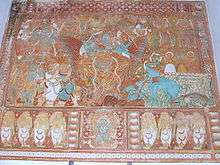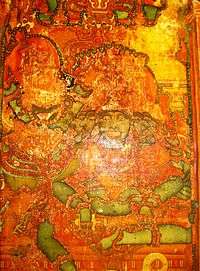Kerala mural painting

Kerala mural paintings are the frescos depicting mythology and legends, which are drawn on the walls of temples and churches in South India, principally in Kerala. Ancient temples, churches and palaces in Kerala, South India, display an abounding tradition of mural paintings mostly dating back between the 9th to 12th centuries CE when this form of art enjoyed Royal patronage.
free style
The masterpieces of Kerala mural art include: the Shiva Temple in Ettumanoor, the Ramayana murals of Mattancherry Palace and Vadakkumnatha kshetram. The "Gajendra Moksham" mural painting in the Krishnapuram Palace near Kayamkulam, the Anantha Shayanam mural painting in the Pallikurup Mahavishnu Temple, Mannarkkad Palakkad District and the mural paintings in the sanctom of Padmanabha temple at Thiruvananthapuram are very famous.Some of the oldest, largest, and best executed murals in Kerala are to be found in the churches at Cheppad, Alappuzha (dozens of panels on the three walls of the Madhbaha depicting scenes from OT and NT),Paliekkara, Thiruvalla ( a dozen panels, scenes from NT), Angamaly(esp. huge murals "Hell", and "Last Judgement"), and Akapparambu.[1][2][3]
Murals

The murals of Thirunadhikkara Cave Temple (now ceded to Tamil Nadu) and Tiruvanchikulam are considered the oldest relics of Kerala’s own style of murals. Fine mural paintings are depicted in temples at Trikodithanam, Ettumanur, Vaikom, Pundarikapuram, Udayanapuram, Triprangode, Guruvayoor, Kumaranalloor, Aymanam, the Vadakkunathan temple in Trichur, the Thodeekkalam temple in Kannur and the Sri Padmanabhaswamy temple at Thiruvananthapuram. Other mural sites are in the churches at Ollur, Chalakkudy, Angamaly, Akapparambu, Kanjoor, Paliekkara, Edappally, Vechur, Cheppad and Mulanthuruthy,[4] and at palaces such as the Krishnapuram Palace near Kayamkulam and the Padmanabhapuram Palace.
The traditional style mural art form, using natural pigments and vegetable colours, is being revived by a new genre of artists actively involved in researching and teaching mural art at the Sree Sankara Sanskrit College in Kalady and also at a mural art school associated with the Guruvayoor temple.
References
- ↑ Menachery, George, ed. The St. Thomas Christian Encyclopaedia of India, Vol. II, 1973; Indian Church History Classics, Vol. I, The Nazranies, Saras, 1998
- ↑ Menachery, George, Glimpses of Nazraney Heritage, Saras, 2005
- ↑ "'Pallikalile Chitrabhasangal'" (PDF).
- ↑ Menachery, St. Thomas Christian Encyclopaedia, II, Trichur, 1973; Indian Church History Classics, Saras, Ollur, 1998
Further reading
- Kossak , Steven (1997). Indian court painting, 16th-19th century.. New York: The Metropolitan Museum of Art. ISBN 0870997831. (see index: p. 148-152)
External links
| Wikimedia Commons has media related to Kerala mural painting. |